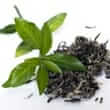Background
- Green tea is made from the leaves of Camellia sinensis, an evergreen shrub native to Southeast Asia. Both green tea and black tea are made from the same plant species. Green tea is produced by lightly steaming the leaves. Black tea is produced by allowing the leaves to ferment.
- Green tea is rich in the class of polyphenol compounds known as catechins. Polyphenols may have health benefits for humans. Many of the effects of green tea are thought to be due to its most abundant catechin, epigallocatechin gallate (EGCG).
- Green tea also contains caffeine. One cup of tea contains approximately 50 milligrams of caffeine, while coffee typically contains 65-175 milligrams of caffeine per cup.
- Traditional health claims for green tea include improved urine flow, relief of joint pain, and improved resistance to diseases. Historically, green tea bags have been applied to the body to soothe sunburn, headache, and tired eyes. Green tea is an accepted cancer prevention treatment in Japan and Fiji.
References
Natural Standard developed the above evidence-based information based on a thorough systematic review of the available scientific articles. For comprehensive information about alternative and complementary therapies on the professional level, go to . Selected references are listed below.
- Ahmed S. Green tea polyphenol epigallocatechin 3-gallate in arthritis: progress and promise. Arthritis Res Ther 2010;12(2):208.
View Abstract - Berube-Parent S, Pelletier C, Dore J, et al. Effects of encapsulated green tea and Guarana extracts containing a mixture of epigallocatechin-3-gallate and caffeine on 24 h energy expenditure and fat oxidation in men. Br J Nutr 2005;94(3):432-436.
View Abstract - Chiu AE, Chan JL, Kern DG, et al. Double-blinded, placebo-controlled trial of green tea extracts in the clinical and histologic appearance of photoaging skin. Dermatol Surg 2005;31(7 Pt 2):855-860.
View Abstract - Choan E, Segal R, Jonker D, et al. A prospective clinical trial of green tea for hormone refractory prostate cancer: an evaluation of the complementary/alternative therapy approach. Urol Oncol 2005;23(2):108-113.
View Abstract - Fukino Y, Shimbo M, Aoki N, et al. Randomized controlled trial for an effect of green tea consumption on insulin resistance and inflammation markers. J Nutr Sci Vitaminol (Tokyo) 2005;51(5):335-342.
View Abstract - Gross G, Meyer KG, Pres H, et al. A randomized, double-blind, four-arm parallel-group, placebo-controlled Phase II/III study to investigate the clinical efficacy of two galenic formulations of Polyphenon E in the treatment of external genital warts. Eur Acad Dermatol Venereol 2007;21(10):1404-12.
View Abstract - Henning SM, Aronson W, Niu Y, et al. Tea polyphenols and theaflavins are present in prostate tissue of humans and mice after green and black tea consumption. J Nutr 2006;136(7):1839-43.
View Abstract - Lambert JD, Elias RJ. The antioxidant and pro-oxidant activities of green tea polyphenols: a role in cancer prevention. Arch Biochem Biophys 2010;501(1):65-72.
View Abstract - Lambert JD, Yang CS. Mechanisms of cancer prevention by tea constituents. J Nutr 2003;133(10):3262S-3267S.
View Abstract - Laurie SA, Miller VA, Grant SC, et al. Phase I study of green tea extract in patients with advanced lung cancer. Cancer Chemother Pharmacol 2005;55(1):33-38.
View Abstract - Moore RJ, Jackson KG, Minihane AM. Green tea (Camellia sinensis) catechins and vascular function. Br J Nutr 2009;102(12):1790-802.
View Abstract - Phung OJ, Baker WL, Matthews LJ, et al. Effect of green tea catechins with or without caffeine on anthropometric measures: a systematic review and meta-analysis. Am J Clin Nutr 2010;91(1):73-81.
View Abstract - Seely D, Mills EJ, Wu P, et al. The effects of green tea consumption on incidence of breast cancer and recurrence of breast cancer: a systematic review and meta-analysis. Integr Cancer Ther 2005 Jun;4(2):144-55.
View Abstract - Stockfleth E, Beti H, Orasan R, et al. Topical Polyphenon E in the treatment of external genital and perianal warts: a randomized controlled trial. Br J Dermatol 2008;158(6):1329-1338.
View Abstract - Westerterp-Plantenga MS, Lejeune MP, Kovacs EM. Body weight loss and weight maintenance in relation to habitual caffeine intake and green tea supplementation. Obes Res 2005;13(7):1195-1204.
View Abstract







